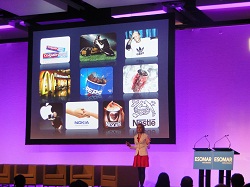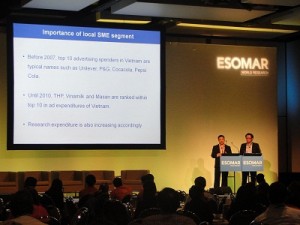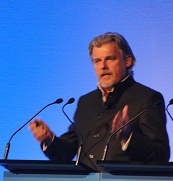Day 1 Conference report, compiled by: Christopher Villani, Toh Yi Fan, Xing Wang and Urmimala Rajkhowa
On a beautifully sunny Monday morning, following a lively welcome drinks reception the previous evening Brian Fine came on to the podium of ESOMAR’s 12th APAC regional conference, and introduced John Marinopoulos to the stage. Both Brian – ESOMAR’s
Australian representative – and John – ESOMAR’s outgoing Treasurer – have long been canvassing for Australia to host an ESOMAR conference, and they were both extremely enthusiastic in welcoming the delegates to Melbourne for ESOMAR’s first visit to Australia – the 2011 APAC regional conference.
John extolled the many delights of Melbourne, extended his good wishes to the traditional guardians of Melbourne, the Wurundjeri people and the Kulin Nation the traditional owners of this land and expressed the collective good wishes of all present to the Japanese people as they face the many challenges of coping with the aftermath of the earthquake and tsunami.
Vanessa Oshima then sent the delegates her apologies and good wishes by video, as she had had to remain in Japan for personal reasons, and was therefore unable to chair the Programme Committee for the event in person.
Darryl Andrew – assuming Vanessa’s responsibilities in her absence, then introduced this year’s keynote speaker, Edward Bell, Regional Planning Director OgilvyOne in China. Under the conference theme of Creating Value Through Simplicity, Ed suggested that the creation of such simplicity needed change, and that the digital (media) revolution represented such change.
Using a series of case histories and illustrative video collages, Ed presented the story of Ogilvys Digital Lab which was set up to anticipate client needs and meet them in advance of the client even knowing it. Through an innovative – and technology-led process, it was clear that this represented a radical change in Ogilvy behavior, and that they had changed the “rules of the game”.
However, Ed still laid three key challenges at the door of the MR industry….
(i) How can we be more proactive?
(ii) What are the new action standards? and
(iii) How can we add value to the Digital media game??
Next up were Roxan Toll (GMI) and Chris Baumann (Macquarie University), whose presentation “Convergence or Divergence of the Asian Market” served to affirm many people’s suspicions that the process of globalization has – within APAC – now evolved into a process of regionalization, as the emerging markets begin to turn their investment power outward and consolidate their position within their own region.
Following the coffee break, we had our first client – agency co-presentation:
Peter Harris, of Vision Critical, & Frederic Anne from Telstra, demonstrated the effectiveness of an on-line community. Telstra is one of the leading telecoms company in the region and possibly the largest spender on MR; this case study clearly demonstrated how the My Telstra Experience allows Telstra to regularly listen to the stories of over 15,000 pre-profiled customers. By longitudinally tracking the customer experience journey, MTE provides a brilliantly simple yet effective generator of insight – clients: Take note!
This was followed by Insight Simplicity, given by Sangeeta Gupta of PepsiCo India, and Andrew Vincent, Waves UK. A very topical presentation that underlined that where you have a wealth of information, a poverty of attention follows, and underscored that we have become “pancake people”- spread too wide and too thin!! To quote an element of the preceding study: “simplicity is the art of subtracting the obvious and adding the meaningful”, this presentation was a real plea for the MR industry to adopt the above principle in our communication of information – check the paper out, its well worth it!
After lunch, Andy Kung of Shangri-la Hotels and Resorts, Hong Kong, took over as session chair and began by talking about a familiar but difficult-to-explain term – ‘glocalization’. Not that there aren’t a dearth of websites and definitions available that try to simplify the term, but the very proliferation only ends up adding to the confusion! A picture is worth a thousand words, and the various Google doodles proved to be an example of how to have a global product but localized for different cultures.
This sentiment was echoed and underlined in the presentation by Olga Churkina of Fresh Intelligence, Canada, who for the first

time revealed the concept and research behind their Glocalization Score. Well-presented, entertaining, and provocative, the correlation of brand values (global or otherwise) to country values is a critical factor for success.
This theme was echoed by Roberto Cappuccio and Peter Kenny of Colmar Brunton, Australia. A viral study, using social media, identified Coffee “Mavens” – trusted expert coffee consumers, who are willing to share knowledge and adopt new trends. This presentation also underlined that what a customer holds in high regard, whether using household or luxury brands, is critical to a brand’s growth and success.
In keeping with the ‘glocal’ flavor of the session, Dung Tran Ngoc and Thong Tuong Tuan of FTA Marketing Research, Vietnam then discussed how international and global MR agencies should reflect on what small and medium enterprises (SME’s) as customers

in less-developed countries – such as Vietnam – consider as important. The conference theme was mirrored in their findings that simplicity is vital when MR agencies have SME clients, yet attendees should consider the barriers of usage and the pros/cons of collaboration versus an integrated offering. Given the nature of many markets in APAC, this was a particularly salient message – suppliers and users, please take note!
The session ended with a panel discussion led by chair Andy Kung on the applicability and adoptability of glocalization across products and industries, and explained that both market researchers and brands can glean rich data when looking for patterns in the role local values play in a company´s success.
The final session of the day was chaired by Alison Dexter, TNS Vietnam, and was entitled “Increasingly Grey” – referring to the aging phenomen increasingly evident in this part of the world.
Sarah Hamburger kicked off the session with a presentation that reinforced for us all, the positive power of the aging brain; “Spinning a Yarn” brought us on a journey of creative techniques that will help us move beyond rational claims, and that can elicit much deeper feelings that might otherwise go unnoticed. Interestingly, Sarah is an Olympic athlete in the clay pigeon shooting discipline, and many of the thinking processes she discussed were also used by her in attaining success in the pinnacle of sports arenas, the Olympic games.

The day ended with an interactive session where delegates were invited to discuss some key elements and challenges in reaching the booming markets of APAC, which are home to some of the oldest populations in the world. Moderated by Dave McCaughan – who we were delighted to see had been able to make it from Japan – the outcomes of this session will soon be seen on RW Connect – watch this space!


